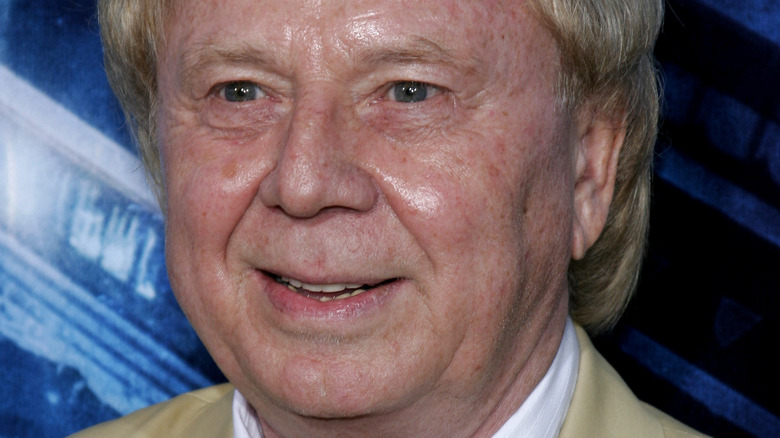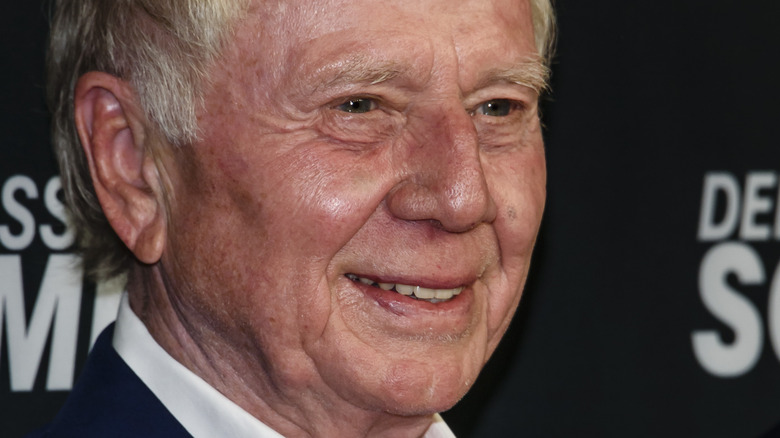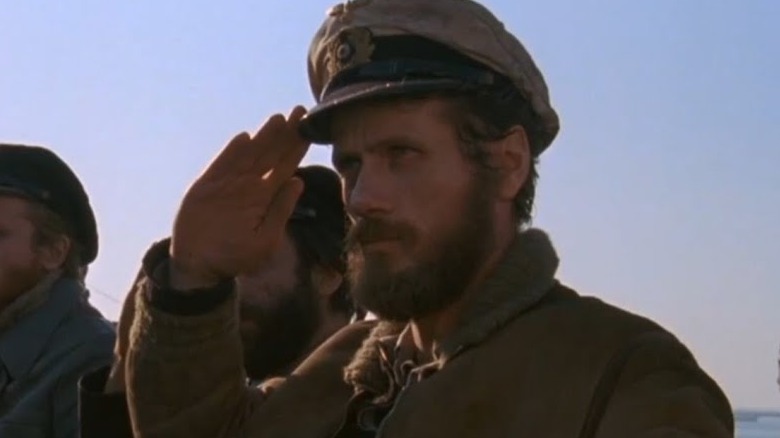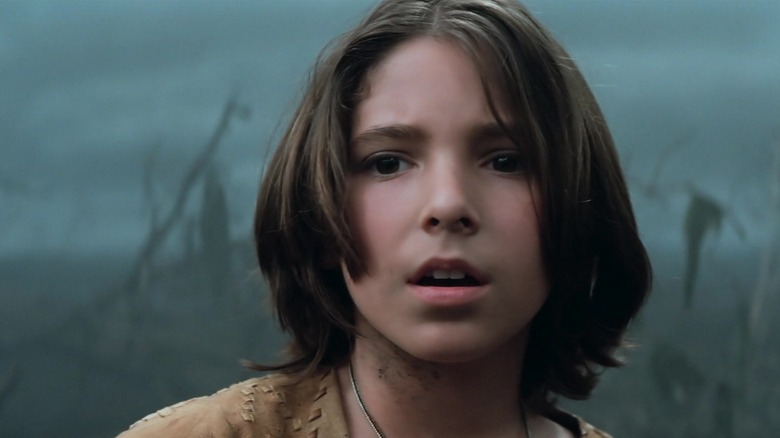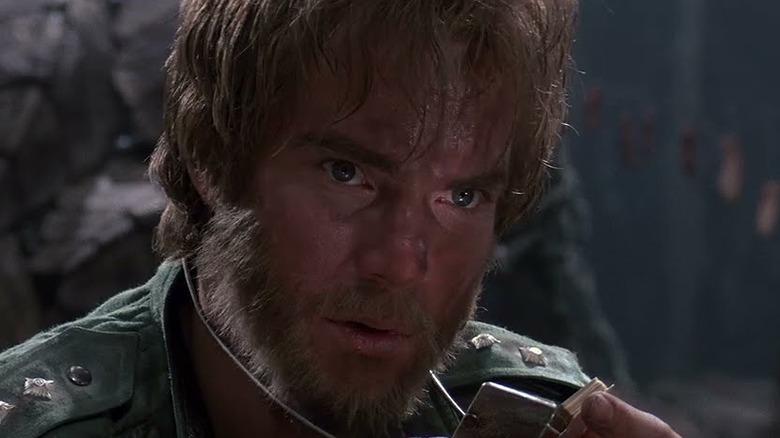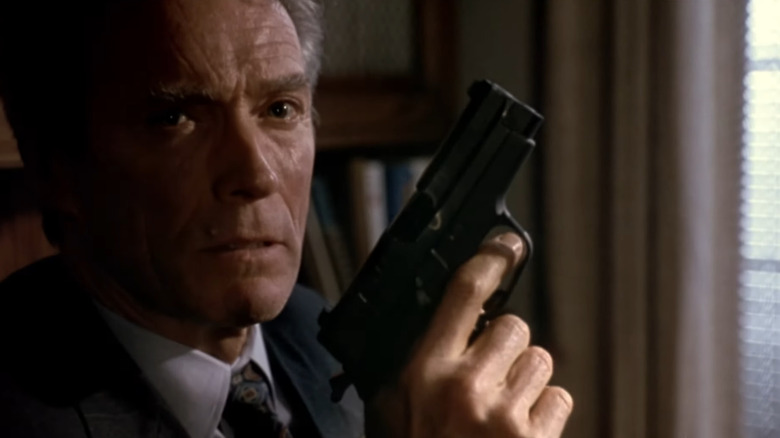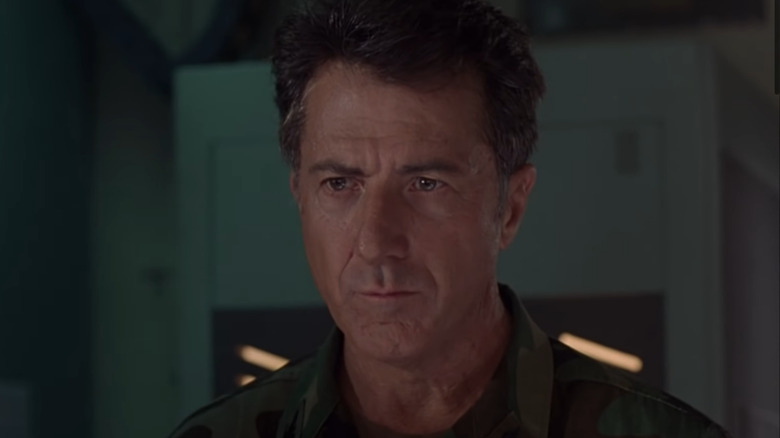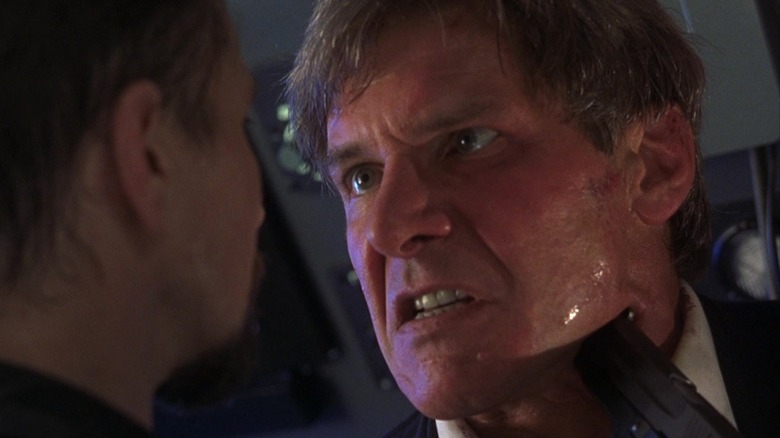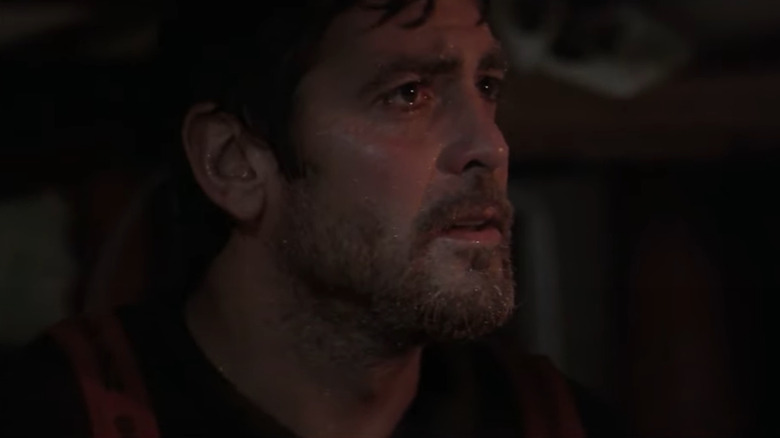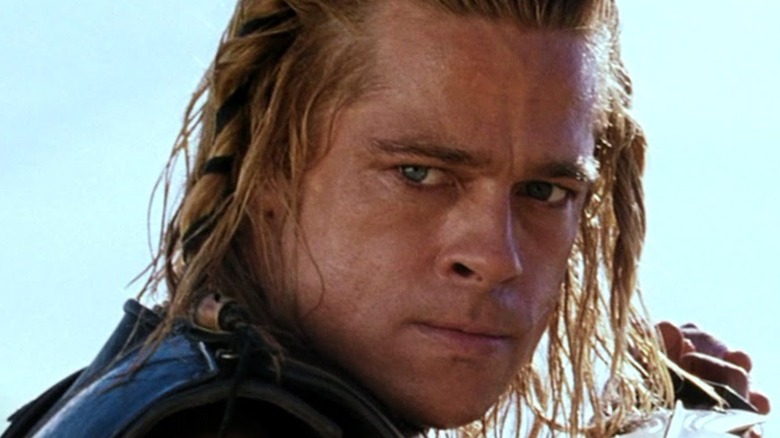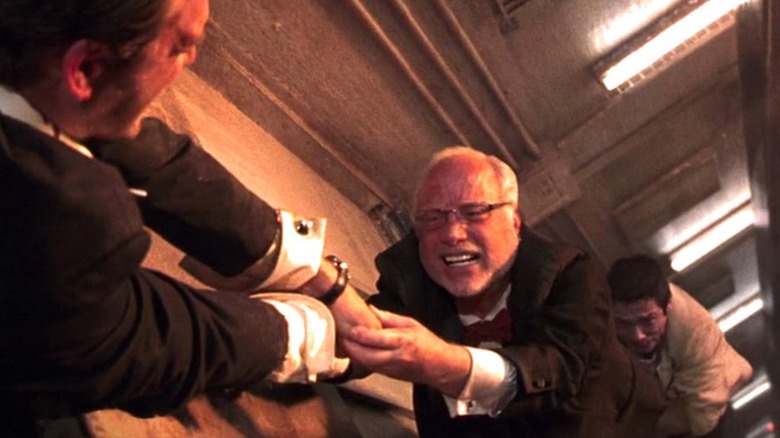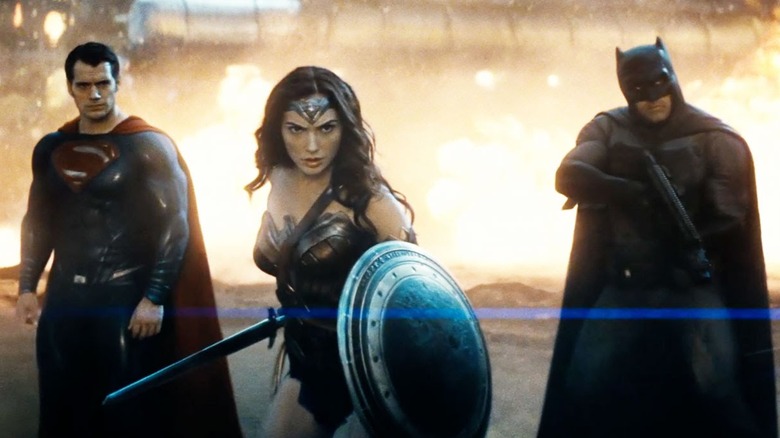The Untold Truth Of Wolfgang Petersen
We may receive a commission on purchases made from links.
Hollywood was saddened to learn of the death of acclaimed filmmaker Wolfgang Petersen, who passed away at the age of 81 from pancreatic cancer (per Deadline). With a legacy that includes such varied work as "Das Boot," "The NeverEnding Story," and "Air Force One," he left behind a great deal to remember him by. A technically accomplished professional, he brought his A-game even when the scripts he was working with were lacking.
Petersen got his start in his native Germany. First, he got a Super 8 camera for Christmas as a kid and, by the age of 14, had made a short amateur western film, as an homage to "High Noon" (per The Guardian). It wasn't long before he was making small television movies with frequent collaborator Jürgen Prochnow. But after making the acclaimed World War II submarine movie "Das Boot" with Prochnow, netting two Academy Award nominations for writing and directing in the process, everything changed, and he started making much more lavish productions in Hollywood. He wound up handling multiple genres, including fantasy, science fiction, neo-noir, disaster, and swords and sandals, with the common theme among them being that they included many thrills. So let's take a look back at how he came to be the man that he was and his many successes and failures.
He grew up by the sea, which greatly influenced his work
With "Das Boot," "The Perfect Storm," and "Poseidon" under his belt, it's only natural that Wolfgang Petersen was often asked why he made so many films about water. As it turns out, Petersen grew up near the sea, and it had an enormous effect on him.
In an interview, Petersen detailed just how much his childhood would come back to him in his professional career, "I must tell you, I am very close to the sea, the water. It's my upbringing, I'm from Hamburg Germany, it's very flat there, and a lot of ocean, and I grew up with that and it influenced me, obviously. When you're a little boy you go to the water and dream. You sit on the shore and you're not 15 and you have a lot of time to think and a lot of things to think about, and there's a long, endless horizon with a lot of space where your thoughts can go." As the son of a naval officer, it's clear how much the sea has meant to him (per The Guardian).
He refers to his three water movies as a sort of loose trilogy that began when he was intrigued by telling a war story in such a cramped setting, then telling a similarly scaled story with a smaller cast, then sticking real people in a sinking ship and seeing what drama unfolds. "It's the biggest force of nature with the most destructive, frightening chaos," Petersen said of the sea.
Hollywood's attempt to make Das Boot fell apart, allowing Petersen to make his version
Before he would become known for making Hollywood thrillers, Wolfgang Petersen's international breakout film was "Das Boot," the submarine thriller that was nominated for six Academy Awards, including Best Director for Petersen. But despite being based on a German book about German sailors, Hollywood was determined to make its own adaptation starring Americans. Petersen's films at that point were much smaller in scope, though, and it was almost made by filmmakers with much more experience than him.
In an interview with Charlie Rose from 2000, Petersen recalled how the project was almost made without him. "And the first group who came to Munich to do 'Das Boot' was John Sturges, the director, with Robert Redford as the commander. Yes. I was next door, so to speak, on the same lot, doing my little television films. And with all the envy in the world, I was looking at them doing this wonderful German story. And I couldn't do it." After that version failed to come together, director Don Siegel and Paul Newman tried to make it, but they also had problems and couldn't shoot the film after over a year of pre-production. After all that, Petersen was finally able to make his version with actors speaking in German, partly using the set that had been constructed for the failed American production.
The author of The NeverEnding Story hated his adaptation
"The NeverEnding Story," a tale about a boy who discovers a magic book, was Petersen's first English-language film and was a big hit in his native Germany. It wasn't quite as successful in the United States, but it has since lived on as a cult classic in particular because of one scene, in the Swamps of Sadness, that traumatized a generation of kids. The film had its detractors though, including the book's author Michael Ende.
Ende was paid a mere $50,000 for the rights and was highly critical of the adaptation when it was released in 1984 saying "I saw the final script five days before the premiere and only as a result of a judicial verdict in Munich. I was horrified. They had changed the whole sense of the story. Fantastica reappears with no creative force from Bastian. For me this was the essence of the book." Despite his misgivings, the adaptation wound up resonating with its target audience.
He had to completely rework Enemy Mine after someone else already started filming it
After "The NeverEnding Story," Wolfgang Petersen made "Enemy Mine," and again, it wasn't much of a financial success in the United States, but it would later develop a cult following. The story of a human (Dennis Quaid) and alien (Louis Gossett Jr.) putting aside their differences to survive was a little too strange for audiences to fully embrace. It wasn't until the 1990s that Petersen would go on to make five straight hits. But the reason why "Enemy Mine" ran over budget wasn't Petersen's fault, as he was brought in to salvage what was going to be a subpar film (per The Los Angeles Times).
Original director Richard Loncraine's footage was unsatisfactory, and he was fired as a result. Petersen was brought in to save it, and he made many changes to the makeup and set design to do so. All this took a lot of time and money, and the film's original $17 million budget ballooned to $40 million. In the end, the film flopped but was able to find its audience eventually.
Clint Eastwood had complete confidence in him
Any director who's hired to work with Clint Eastwood would likely be intimidated by the task. Since Eastwood is a director himself, he can be very demanding and take over when he's disappointed in his collaborator. He fired Phillip Kaufman from "The Outlaw Josey Wales" to make it himself, and while Richard Tuggle remains the credited director of "Tightrope," Eastwood reportedly did most of the heavy lifting (per The New Yorker).
However, for "In The Line of Fire," Wolfgang Petersen's thriller about a Secret Service agent protecting the president of the United States, Eastwood didn't step in to micromanage. Petersen revealed to Charlie Rose that Eastwood agreed to hire him after just a single meeting and let him have complete control. "I mean, he would never really come and say, 'I think you should do it from here, and why don't you do this?' ... He trusted me as a director, I had the feeling, and that helped very much for him to get a great performance out." In the 29 years since that film, Eastwood has only let himself be directed by someone else once, in 2012's "Trouble with the Curve," made by his longtime producing partner Robert Lorenz.
What it was really like to work with Dustin Hoffman
Along with Steven Soderbergh's "Contagion," Wolfgang Petersen's "Outbreak" enjoyed an uptick in interest when the novel coronavirus first spread throughout the world in 2020, since both films dealt with diseases (per Business Insider). While "Outbreak" may have lacked the realism of "Contagion," its entertainment value was oddly comforting in such uncertain times.
After Harrison Ford turned the project down, Petersen still needed a star to carry the film. As he told Charlie Rose, he was having lunch with Dustin Hoffman when Petersen realized that he was perfect for the role. Petersen knew about Hoffman's reputation for being "difficult" but believes that he is so professional that he only rarely has trouble with actors.
In a separate interview for DW, though, he revealed that Hoffman was insecure about not being Petersen's first choice. "He had these moments when he said, "I can't do this, Wolfgang!" And I'd say, 'What's the problem? You just turn around slowly and use your body language.' And he'd go, "Yeah I know, Harrison Ford would do that in a second, right?" Oddly enough though, while Petersen would eventually work with Ford, he almost didn't get to.
You'll never guess who almost starred in Air Force One
"Air Force One" has an irresistible premise. What if the "fly in the ointment" John McClane character in a "Die Hard" rip-off was the president of the United States? And what if that president was played by Harrison Ford? It doesn't matter that the character is technically named James Marshall. "Scary Movie 3" essentially summed up the movie's appeal when Leslie Nielsen says, "I wonder what President Ford would have done," and he doesn't mean Gerald.
It's surprising then, to find out that Ford wasn't the first choice for the role. As Ford told The Los Angeles Times, "This was a script that Kevin Costner originally had and he gave it to me. Kevin knew this was a big commercial movie and his schedule didn't allow him to do it." Costner was 42 years old in 1997, which would have made him our youngest president ever, though, and Wolfgang Petersen finally got to work with the actor that he wanted to in "Outbreak."
How he convinced George Clooney to be in The Perfect Storm
George Clooney wasn't Wolfgang Petersen's first choice to star in "The Perfect Storm," but he came around to the idea after it was suggested to him by a producer. While Clooney wanted to be in the film, he thought he would be a better fit for the role that would eventually go to his "Three Kings" co-star Mark Walhberg. He wanted the more everyman character and thought the part of a sea captain would be more grizzled. But as it turns out, the Hollywood stereotype of how old captains usually are isn't very accurate.
Petersen explained how he eventually got Clooney to come around to Charlie Rose: ”'You know, George, you are maybe already a little old for the part, you know, this guy was 37. You're 38.' ... So then I think he [maybe] had a little bit [of] hesitation if he can fill the shoes of this big part." Many people were surprised that a film with such a depressing ending would be such a financial success, but Petersen gives credit to the relatable characters.
The director's cut of Troy was much better received
Taking in almost $500 million, "Troy" was the biggest hit of Wolfgang Petersen's career, but it received mixed reviews from film critics. While Brad Pitt was praised for his performance, Petersen and future "Game of Thrones" co-creator David Benioff, who wrote the screenplay, were criticized for favoring spectacle over characters and not giving things proper time to breathe. However, with 30 minutes of extra footage, Petersen was able to deliver the film that he really wanted to.
IGN praised the new cut in its official review, and in a separate interview with them, Petersen discussed what he felt went wrong with the theatrical cut, "It's all about previews and studio notes. Short attention spans. Too sexy; too violent. [...] And all of a sudden, you don't realize that you are working exactly against the spirit of the original material." Thankfully, though, the film made enough money that the studio was willing to invest a small amount to let Petersen present his original vision.
He regrets making Poseidon
You can't blame Wolfgang Petersen for returning to the water after the success of "Das Boot" and "The Perfect Storm." Those films made Petersen the ideal choice to helm "Poseidon," his remake of 1972's disaster movie "The Poseidon Adventure." Unfortunately, the film only grossed $180 million against a budget of $160 million, which ended his streak of consecutive hits.
Petersen later revealed his unhappiness with the film. "What I probably should not have done is the film 'Poseidon.' I was on a roll at that time. 'In the Line of Fire,' 'Outbreak,' 'Air Force One,' 'Perfect Storm,' 'Troy' — I did all these films in a row, and each one was more successful than the one before. Five in a row. So they said, 'Wolfgang can do anything. Just give him all the money, we'll be fine.' But it wasn't. I shouldn't have done it, because it just doesn't work like that. At some point you fail." Critics agreed, and despite the star-studded cast and A-list talent behind the scenes, "Poseidon" wound up being a black mark on Petersen's ledger.
What his version of Batman v Superman would have been like
After the box office failure of "Poseidon," several projects that Wolfgang Petersen was involved in fell apart and would be completed by other directors. He was supposed to adapt "Ender's Game" into a feature, but left what would eventually be completed by director Gavin Hood in a 2013 film starring Harrison Ford. And while his version of Batman v Superman was planned before the productions of "Batman Begins" and "Superman Returns," he was still hopeful that he'd get to make it back in 2006 (per Collider).
The director said he wasn't interested in doing a solo film, "but to do the two parts of the soul in your breast, the goody goody Superman and the bad Batman. We have both in ourselves and I thought that if we explore how these guys in one film together fight it out, so to speak, the darkness and the lightness." Director Zack Snyder's 2016 film "Batman v Superman: Dawn of Justice" wound up being completely different, deemphasizing the "goody goody" aspect of Superman that Petersen planned to highlight while keeping the grim tone and tragic nature of the story.
He returned to Germany for his last film
Wolfgang Petersen only made one other film after "Poseidon," and it's one you've probably never heard of. In 2016, he made "Four Against the Bank," his first film in 10 years and his first German film since "Das Boot" in 1981. Don't feel bad if this is the first you're hearing of it though, since it was never released in the United States, barely released anywhere outside of Germany, and doesn't have a single review on Rotten Tomatoes. It's available to rent on Amazon for anyone curious though. You might recognize Matthias Schweighöfer ("Army of the Dead," "Army of Thieves") and Til Schweiger ("Inglourious Basterds") as two of the central four bank robbers.
The film is a remake of his own television film from 1976 and his first ever comedy, and the differences are largely due to that time gap, the director said: "In my old film in 1976, these four people were rich. They lost their money because of financial problems and then they want to rob the bank to get their money back. [...] You cannot do that anymore today." He said that his new film's characters "saved money in order to better their lives and all of a sudden that bank does bad things and screws them. [...] The bank is the bad guy. That's a concept that works today." We wish we could have seen more from Petersen, but he got to end his career on his own terms.
